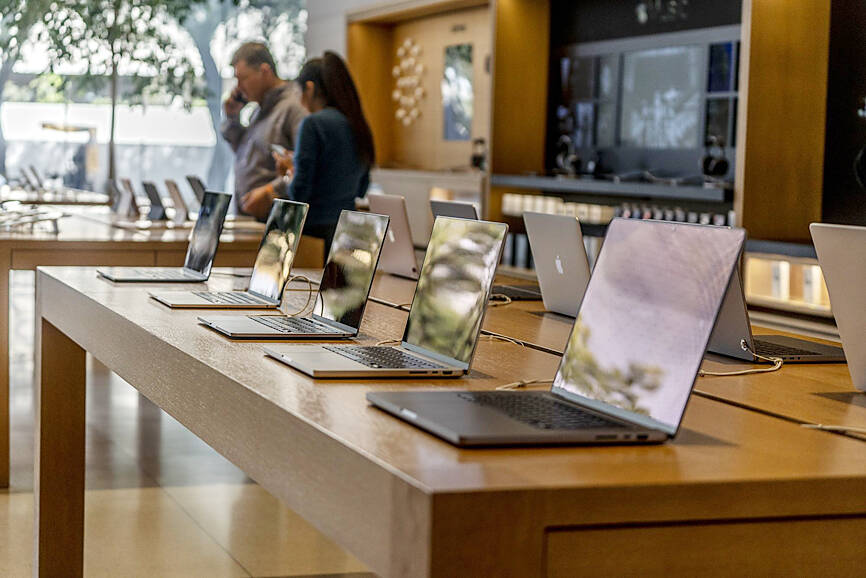Apple Inc’s PC shipments plunged 40.5 percent year-on-year in the first quarter of the year, marking a tough start to the year for PC makers still grappling with a glut of unsold inventory.
Shipments by all PC makers combined slumped 29 percent year-on-year to 56.9 million units — and fell below the levels of early 2019 — as the demand surge driven by the COVID-19 pandemic-era remote work evaporated, International Data Corp (IDC) said in a report on Sunday.
Among the market leaders, Lenovo Group Ltd (聯想) and Dell Technologies Inc registered drops of more than 30 percent, while HP Inc was down 24.2 percent. No major brand was spared from the slowdown, with Asustek Computer Inc (華碩) rounding out the top five with a 30.3 percent fall.

Photo: Bloomberg
The slowdown in consumer spending over the past year has led to double-digit declines in smartphone shipments and an accumulating glut among the world’s foremost memorychip suppliers.
Samsung Electronics Co, which provides memory chips for portable devices, as well as desktops and laptops, last week said it was cutting memory production after reporting its slimmest profit since the global financial crisis of 2008-2009.
“Though channel inventory has depleted in the last few months, it’s still well above the healthy four to six week range,” IDC research manager Jitesh Ubrani said in the report. “Even with heavy discounting, channels and PC makers can expect elevated inventory to persist into the middle of the year and potentially into the third quarter.”
A silver lining is that the cooling demand is giving manufacturers the time and room “to make changes as many factories begin to explore production options outside China,” IDC said in the report.
The IDC researchers foresee a potential rebound for PC makers this year, driven by a combination of aging hardware that will need to be replaced and an improving global economy.

SEEKING CLARITY: Washington should not adopt measures that create uncertainties for ‘existing semiconductor investments,’ TSMC said referring to its US$165 billion in the US Taiwan Semiconductor Manufacturing Co (TSMC, 台積電) told the US that any future tariffs on Taiwanese semiconductors could reduce demand for chips and derail its pledge to increase its investment in Arizona. “New import restrictions could jeopardize current US leadership in the competitive technology industry and create uncertainties for many committed semiconductor capital projects in the US, including TSMC Arizona’s significant investment plan in Phoenix,” the chipmaker wrote in a letter to the US Department of Commerce. TSMC issued the warning in response to a solicitation for comments by the department on a possible tariff on semiconductor imports by US President Donald Trump’s

The government has launched a three-pronged strategy to attract local and international talent, aiming to position Taiwan as a new global hub following Nvidia Corp’s announcement that it has chosen Taipei as the site of its Taiwan headquarters. Nvidia cofounder and CEO Jensen Huang (黃仁勳) on Monday last week announced during his keynote speech at the Computex trade show in Taipei that the Nvidia Constellation, the company’s planned Taiwan headquarters, would be located in the Beitou-Shilin Technology Park (北投士林科技園區) in Taipei. Huang’s decision to establish a base in Taiwan is “primarily due to Taiwan’s talent pool and its strength in the semiconductor

An earnings report from semiconductor giant and artificial intelligence (AI) bellwether Nvidia Corp takes center stage for Wall Street this week, as stocks hit a speed bump of worries over US federal deficits driving up Treasury yields. US equities pulled back last week after a torrid rally, as investors turned their attention to tax and spending legislation poised to swell the US government’s US$36 trillion in debt. Long-dated US Treasury yields rose amid the fiscal worries, with the 30-year yield topping 5 percent and hitting its highest level since late 2023. Stocks were dealt another blow on Friday when US President Donald

UNCERTAINTY: Investors remain worried that trade negotiations with Washington could go poorly, given Trump’s inconsistency on tariffs in his second term, experts said The consumer confidence index this month fell for a ninth consecutive month to its lowest level in 13 months, as global trade uncertainties and tariff risks cloud Taiwan’s economic outlook, a survey released yesterday by National Central University found. The biggest decline came from the timing for stock investments, which plunged 11.82 points to 26.82, underscoring bleak investor confidence, it said. “Although the TAIEX reclaimed the 21,000-point mark after the US and China agreed to bury the hatchet for 90 days, investors remain worried that the situation would turn sour later,” said Dachrahn Wu (吳大任), director of the university’s Research Center for